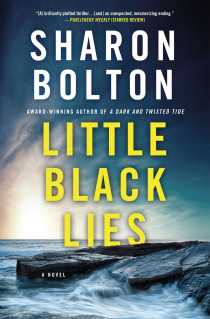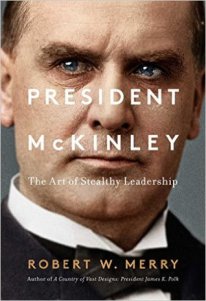“What are they doing?” (Galloway 189).
This question was inquired by Arrow, who was referring to the men on the hills. Although she brawls for the city’s defense, even she is unaware of her enemy’s motivations.
The Cellist of Sarajevo blossoms a chaotic world that is crumbling from merciless invaders. The novel captures life under siege rather than a history lesson of the war, but for me, this creates hollowness. It is clear that the men on the hills are corrupt, since it is never acceptable to take the lives of the innocent, but what awoke the ferocious mentality of these men? Who are they? How does murdering innocent civilians support their unknown cause? Why is Sarajevo seemingly helpless in its defense?
What is the bigger picture outside of Sarajevo?
I found my answers in an article published in 1994, during the events of the siege.
Yugoslavia, a multicultural society, encountered political tension that would divide the nation into individual states. Serbia became the most uptight over the presumable detachment, as Serbs residing in the newly autonomous states may be oppressed. Following Yugoslavia’s separation, Serbia embarked upon a mission of genocide in their neighboring factions, which was their approach to ethnic cleansing. Sarajevo was besieged by Bosnian Serbs who rebelled against the country and were supplied by Serbian forces.
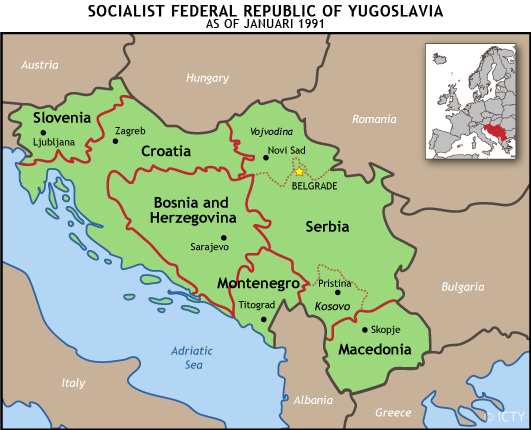 A map of former Yugoslavia.
A map of former Yugoslavia.
This explains the motivations of the men on the hills in The Cellist of Sarajevo. The Serbs believed that the citizens of Sarajevo despised them and would oppress them. Thus, they aspired to liberate Bosnia from the Bosnian Muslims and claim it as Serbian territory. This commenced the endless cycle of blind hate that I explained in my blog post about my overlooked messages from the novel.
The article unexpectedly fed more of my curiosity on a different topic. I was always intrigued regarding the absence of external forces in the story. America’s inaction is the most confusing, since the nation has frequently acted as an international police force. This was genocide, and America is often obligated to prevent crimes against humanity. In my Second Discussion Post, I briefly mentioned international support. The article explains the role adopted by the United States and how they could have taken larger action.
The lack of western support triggered criticism from the public. America, under the presidency of George Bush, knew that a civil war was about to erupt before Yugoslavia’s collapse. The Secretary of State, James Baker, cautioned Yugoslavian leaders of Serbia’s developing aggression. Other than this, the United States did not make much effort to prevent the inevitable civil war.
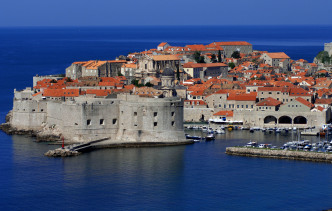 An image of Dubrovnik, Croatia. This was one of the first cities that the Serbs assaulted.
An image of Dubrovnik, Croatia. This was one of the first cities that the Serbs assaulted.
Serbia’s first target was Croatia, who was desperate for external aid. The Pentagon declined deployment of infantry or airstrikes to impede the Serbian forces before they got out of hand. I surmise this lack of action was to save American lives, equipment and money from being wasted on a conflict that does not concern the west.
Once the Serbians assaulted Bosnia, US airstrikes in the territory would have made it clear that the west would become involved if the Serbs continue. However, Washington was discouraged by the possibility that bombardments may destroy the Serbian positions in the mountains. This would have caused the rebels to march on the city, thus blocking imports of food. Therefore, in The Cellist of Sarajevo, we see the snipers hiding in the mountains without fear of an assault from above. But why was Bosnia unable to launch any airstrikes from their own arsenal?
Under the influence of America’s Secretary of State, James Baker, Europe embargoed all of the Yugoslavian nations. Baker’s intent was to reduce the arsenal of each nation in order to decrease the intensity of the conflict. Alas, this only weakened Serbia’s rivals. Since the Serbs were prepared for the war, this did not cause them much harm. President Bush rejected the idea of lifting the embargo, which was later proposed by the Pentagon. This explains Bosnia’s helpless position compared to the men on the hills.
I was surprised to learn that the Bosnian government did hope for American aid once George Bush was replaced by Bill Clinton in 1993. I was also surprised to learn that Clinton proposed a peace treaty that disappointed the government officials of Bosnia.
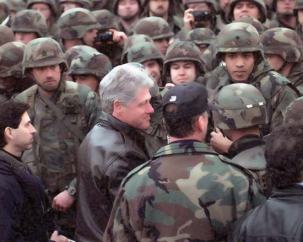 President Bill Clinton in Bosnia.
President Bill Clinton in Bosnia.
Bosnia anxiously waited as Clinton’s team developed a plan. The White House ultimately offered a peace treaty to the Bosnian Serbs. The treaty would give the Serbs 43% of the nation, the Bosnian Muslims 31%, and the Croats 21%. Since the Serbs were succeeding decisively, they refused to negotiate. This also made it evident to the Serbs that America will remain passive in the conflict. The Bosnian government was furious that the United States offered such a pointless treaty. President Clinton decided to temporarily ignore the issue, and passed it on to new officials.
What does the White House do now? National Security Adviser Anthony Lake, thought that perhaps the embargo could be lifted but Europe did not approve of this. They also refrained from an airstrike, as they did not want Serbia to act violently against them.
The Americans eventually labelled the crisis as a “European Problem.” Secretary of State, Warren Christopher, explained how the Jews never committed any atrocities towards the Germans during the Holocaust. However, the Bosnian Muslims have performed such actions towards the Serbs. Therefore, Washington decided not to pick sides.
After the Serbs launched 3,777 shells, and later launched a single mortar shell that murdered 68 citizens, Christopher decided to propose another peace treaty. The Serbs finally removed their forces from Sarajevo for a temporary cease-fire.
Simply put, the Americans did not wish to waste their military resources on a conflict that did not directly concern them. Rather, they hoped to solve the issue diplomatically. This explains the lack of American military support in The Cellist of Sarajevo.
What about the United Nations? Europe did supply peacekeepers, and in 1993, they established six safe areas in Bosnia that could harbor refugees. This was a delayed response, since the conflict had already been active for 2 years.
The contributions of the United Nations and America were never mentioned in The Cellist of Sarajevo. Perhaps they occurred after the events of the story (which indicates the slow response of the world), or maybe their contributions were ineffective. It is also possible that this demonstrates the heavily disrupted circulation of news in the city.
In The Cellist of Sarajevo, Kenan believes that, “what the world wants most is not to think of it at all” (Galloway 61). Clearly, he has good reason to think that.
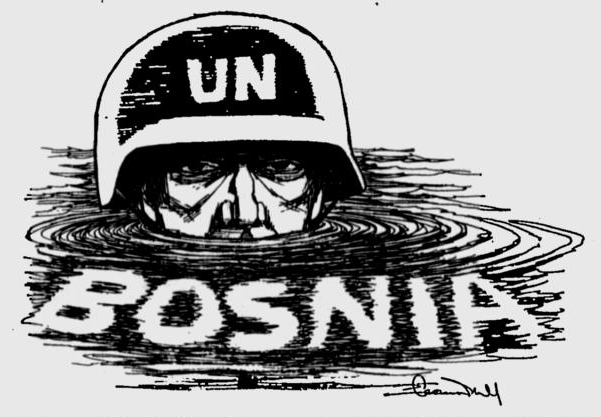
Although complicated, it is now completely clear as to why western support is never seen in Steven Galloway’s novel. I believe that this is deliberate, as to show criticism to the western’s passiveness.
This article also explains the motivations of the men on the hills, and how they were able to overwhelm Sarajevo without much retaliation from Bosnia.
I have also realized that the Bosnian Conflict was a complicated issue. If Stephen Galloway’s novel elaborated on the historical background, it would have become a history textbook, and thus divert the reader from the story’s themes.
SOURCES
Cary, Peter. Hedges, Stephen J. “The Road to Ruin.” ebscohost. U.S. News & World Report, L.P., 12 Dec. 1994. Web. 31 Dec. 2017. <http://web.a.ebscohost.com/ehost/detail/detail?vid=0&sid=d9d9e289-36ee-421d-860f-8812425d7897%40sessionmgr4009&bdata=JnNpdGU9ZWhvc3QtbGl2ZQ%3d%3d#AN=9412157504&db=aqh>.
Davis, Kyle. “Bosnian conflict.” Bosnian Conflict, U.S. Department of Defense, Encyclopedia Britannica, Inc, 30 Nov. 2017. <https://www.britannica.com/event/Bosnian-conflict>.
“Dubrovnik.” Dubrovnik in Spring, Time Out. <https://www.timeout.com/croatia/things-to-do/dubrovnik-in-spring>.
Neuffer, Eliabeth. “Credibility of the United Nations Vanished in Bosnia.” Srebrenica Genocide Blog, Blogger. 19 Mar. 2011. <http://srebrenica-genocide.blogspot.com/2011/03/credibility-of-united-nations-vanished.html>.
“Socialist Federal Republic of Yugoslavia.” The Former Yugoslavia, United Nations. <http://www.icty.org/en/about/what-former-yugoslavia>.
Advertisements Share this:


